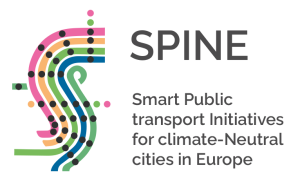Projects

Harmony
The H2020-funded HARMONY project aims to develop a new generation of harmonised spatial and multimodal transport planning tools that will enable metropolitan authorities to lead the transition to a low carbon new mobility era in a sustainable manner. The HARMONY model provides an integrated approach necessary for authorities which quantifies the multidimensional impact of various concepts, soft and hard policies on citizens’ quality of life, sustainability, economic growth, while identifying the most appropriate solutions and recommending ways to exploit advances in mobility concepts. The model suite is already linked to six EU metropolitan areas assisting research: Rotterdam, Oxfordshire, Turin, Athens, Trikala and Upper Silesian-Zaglebie Metropolis.
MobyX developed the HARMONY MS platform and advanced the MobyApp software as a service platform.
Frontier Future Mobility


MOVE2CCAM
- Explores the impact of CCAM passenger and freight solutions; defines use cases, business models and KPIs through co-creation activities with the “Satellites”
- Develops a practical system dynamics-based impact assessment tool that will enable the evaluation of CCAM interventions’ impact on mobility-, socio-economic-, public health- and environmental-related aspects considering diverse European region specifics and different actors’ needs, objectives and perceptions
2023
GREEN-LOG


EXTREME-XP
ExtremeXP proposes a new paradigm for data analytics.
This paradigm consists of experimentation-driven analytics, to provide accurate, precise, fit-for-purpose, and trustworthy data-driven insights via evaluating different complex analytics variants, considering end users’ preferences and feedback in an automated way.The ambition is to provide capabilities for learning from experimentation to predict user requirements, profiling the user, and proactively generating the accurate analytics workflow towards more precise outcomes and personalized insights for decision making and focusing on the user experience, requirements, and needs and putting him in the center of the decision-making process.ExtremeXP will integrate cutting-edge research results from the domains of data integration, machine learning, visual analytics, explainable AI, decentralized trust, knowledge engineering, and model-driven engineering into a common framework.
SPINE
SPINE’s vision is to accelerate the progress towards climate neutrality by reinforcing PT systems through their smart integration with new mobility services, sharing schemes, active transport modes, and micromomibilty. SPINE adopts an equity centred design thinking approach, leading the transition to a more efficient, sustainable, resilient, and inclusive PT system. A network of collaborative LLs is developed to foster transferability, while an intersectional view of the transport system users is applied. Four Lead City LLs in Antwerp, Bologna, Tallin and Las Palmas will be established, and a series of co-creation activities will take place where multiple stakeholders will be actively engaged in the development and demonstration of efficient, replicable, and socially acceptable innovative mobility solutions, advancing existing assets.
The SPINE approach involves the creation of (a) innovative simulation and Digital Twining (DT) tools, along with open data and behavioural models, that will allow the building of scenarios combining different mobility interventions (push and pull measures along with supporting policies) and the implementation of the most promising ones; (b) data-driven impact assessment models that will foster the twinning, transferability and adaptation of the successful solutions of the four LLs in seven Twining Cities – Barreiro, Valladolid, Zilina, Sibenik, Hrakleion, Gdynia and Rouen-. SPIRE sets a high ambitious plan for the co-design and implementation of 55 smart greens inclusive mobility solutions.
The unique mix of experienced transport engineers, Public transport Operators, computer scientists, data analysts, transport modelers, social scientists, urban planners, policy analysts, software providers, within our consortium assures the comprehensive approach to the challenges, scope, expected impact and the successful delivery of the project.


